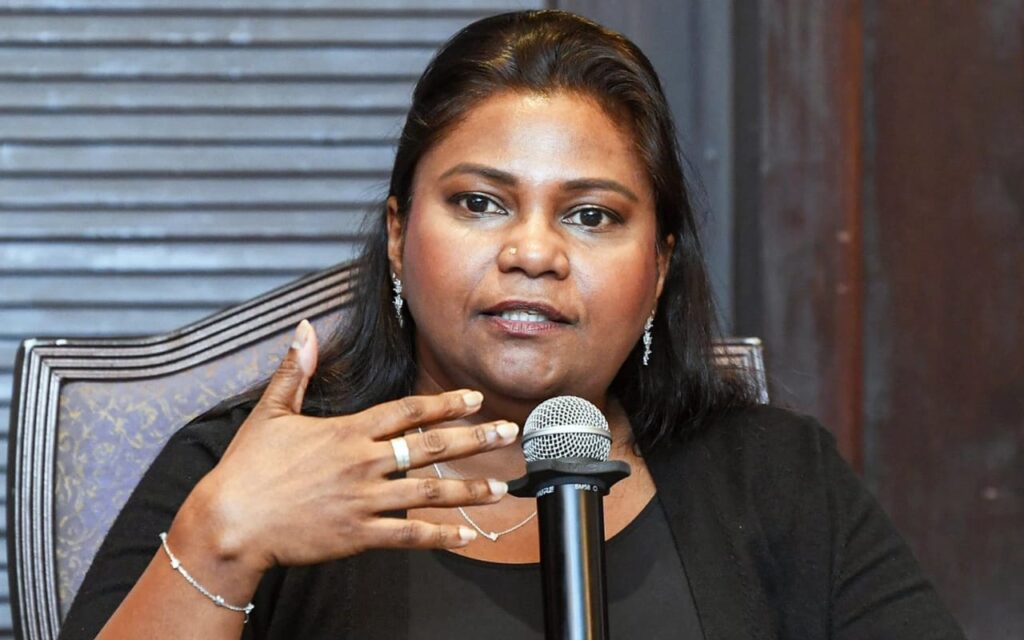DAP International Secretary Kasthuri Patto issued the following statement on Thursday 9th October 2025 in Kuala Lumpur, a day ahead of the World Day Against the Death Penalty. Her statement has been published in its entirety.

The death penalty protects no one – Institutional reforms, eradicating corruption and abuses of power, education and closing the socio-economic gap remains key deterrents to using the death penalty.
Tomorrow marks the World Day Against the Death Penalty with the theme “The Death Penalty Protects No One” and this year particularly it is very difficult to pen down my thoughts when my heart is full of sadness at the executions of 4 Malaysians this year in Singapore, the latest being Pannir Selvam Pranthaman who was executed yesterday, the 8th of October in Changi Prison. There are 2 more Malaysians awaiting their executions date in Singapore.
After decades of campaigning, lobbying, activism and international solidarity and support, Malaysia under the MADANI Government abolished the mandatory death penalty in 2023. This historic amendment comes in line with Malaysia taking baby steps in the right direction to uphold the rule of law.
Unlike other matters of human rights, the death penalty is often contested by many and everyone has an opinion about it – to justify and to object.
The death penalty in Malaysia stemmed from the British colonial law which they abolished in 1964, 7 years after Malaya’s independence in 1957. While they have abolished it, Malaysia mantains a moratorium where the last 2 executions in Malaysia took place was in 2017.
The theme for this year’s commemoration that the death penalty protects no one is apt as some Governments have chosen to hide behind the veil of their incompetency and ineffectiveness to prevent crime and therefore using the death penalty as a tool to fight crime and instil confidence for the people in the name of national security and also the fear that if “you do the crime, you do the time”.
The death penalty is inhumane and is no measure to uphold justice. No system is perfect and no investigative process nor judicial system is without flaw and that is why laws, policies and systems all over the world are changing, evolving and progressing. What was a dream decades ago on artificial intelligence (AI) is here today, creeping and making its way into our lives. And yet, so many amongst us hold on to this archaic form of punishment, driven by anger and emotion and sometimes unfamiliarity of the law and the details surrounding the death penalty.
In Singapore, the Government’s stand is simple – the death penalty protects Singapore and keeps the people safe from drug harm. Ironically, last year, new drug abusers increased by 30% according to the Central Narcotics Bureau (CNB) in spite of the heavy sentence on trafficking drugs across the border or within.
In Malaysia, the drug menace has also plagued the nation with children as young as 10 as drug casualties. And in spite of sentencing traffickers to death, the numbers seem to climb. While Malaysia has abolished the mandatory death penalty, crimes that are linked to drugs especially are still prevalent, worse now with children having easier access to it. The death penalty is certainly not the magical weapon that is going to magically make drugs disappear. It is regretful that Malaysians are not executed on Malaysian soil but across the border in Singapore. We must empower ourselves with knowledge and the latest information on the production, circulation, distribution and the trafficking of drugs and why the death penalty is not a deterrent and it certainly protects no one.
On the 28th of September, the National Security Committee at the Israeli Parliament (Knesset) approved a draft bill for first reading that would authorise the execution of Palestinian prisoners including “convicted of murder motivated by racism or hostility toward a particular public, and under circumstances where the act was committed with the intent to harm the State of Israel…”, with no possibility of commutation. This strips away judicial discretion and contradicts comparative legal standards that emphasise the judge’s role in assessing criminal elements and the presence of intent. In this way, execution is closer to being used as a tool for vengeance against Palestinians and kill them en mass as a part of the ongoing genocide in Gaza. My stand is clear. Israel has broken every code of conduct on human rights laws and must be condemned. How can the death penalty be ever justified under a botched and tyrannical system like this?
Like in so many cases, are we simply going to sit back to say, “Respect the law in that country” or “Don’t interfere with laws in another country” or “That’s how they rule”?
Countries and communities are safer when there is a lesser socio-economic gap, education available and accessible for all, when income disparity is reduced, when resources are channeled for mental health, when abuses of power and fraud are systematically dismantled. Public institutions must be reformed in line with international standards and best practices – from the judiciary to the anti-corruption commission, to the police force and the Attorney General’s office according to the principles of good governance, transparency, accountability and integrity. Governments must prioritise the concerns of the people, increase awareness and campaigns on safety, tackling root causes of crime, eradicating corruption, imposing consistent enforcement and creating safer societies without using the death penalty as a reason that will solve all problems and crimes. It is as if all a country’s problems can be solved with the death penalty, and the death penalty alone, but nothing is further than the truth.
The death penalty protects no one and has no place anywhere in the world.
“Injustice anywhere is a threat to justice everywhere” – Martin Luther King.
— WE